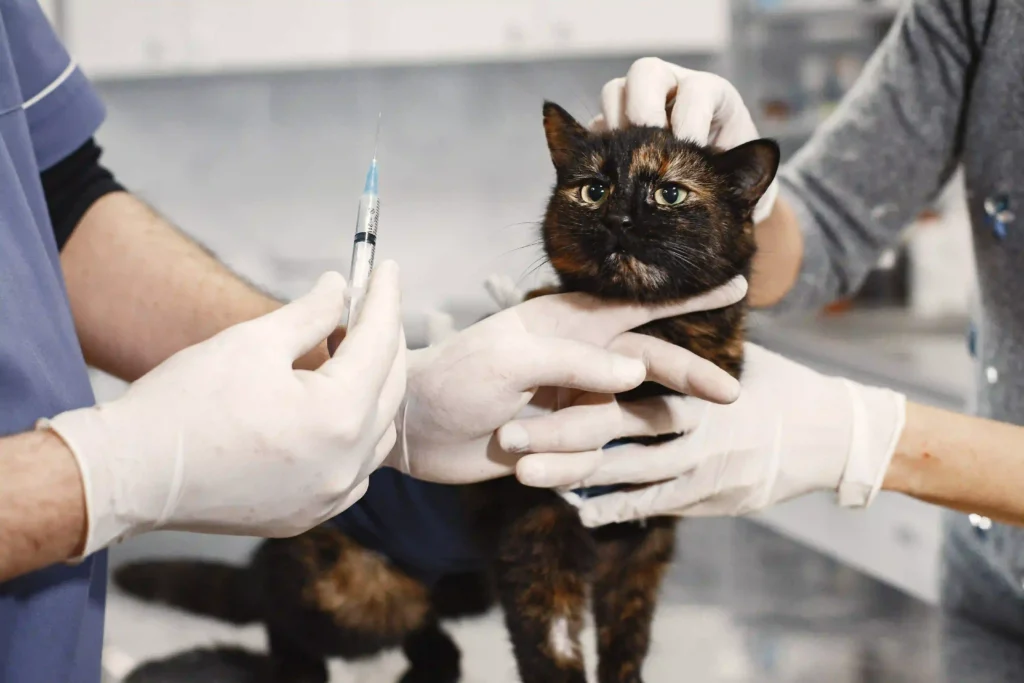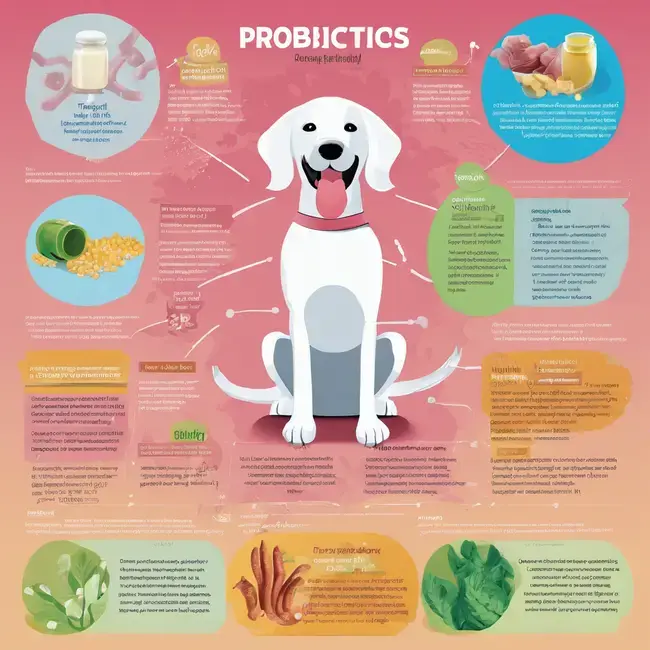Can Dogs Eat Broccoli? Discover 10 Nutritional Benefits

- Can dogs eat broccoli?
- How much broccoli can a dog eat?
- Nutritional value of broccoli for dogs
- 10 nutritional benefits of broccoli for dogs
- Can dogs eat raw broccoli?
- Can dogs eat broccoli stems?
- Can dogs eat cooked broccoli?
- Potential Health Risks of Broccoli for Dogs
- Other safe vegetables for dogs
- Safe fruits for dogs
- Conclusion: Is broccoli good for dogs?
- Frequently Asked Questions (FAQs)
- Citations and References
This post may contain affiliate links, meaning I may earn a commission if you make a purchase, at no extra cost to you. I only recommend products I trust. Thank you for your support.
Welcoming all pet parents and dog enthusiasts!
If you’ve ever wondered about expanding your dog’s diet beyond traditional dog food, you’ve likely considered various human foods.
One such option is broccoli, a nutritious and fiber-rich vegetable that often finds its way onto our plates. But what about our canine companions? Can dogs eat broccoli?
In this article, we’ll delve into the potential benefits, risks, and nutritional value of broccoli for dogs to help you make informed decisions about your pet’s diet.
Can dogs eat broccoli?
Yes, dogs can eat broccoli. Broccoli is a safe and nutritious vegetable for dogs, offering essential vitamins, minerals, and fiber.
However, it’s important to feed broccoli to dogs in moderation and preferably in steamed or cooked form to aid in digestion.
How much broccoli can a dog eat?
Dogs can eat broccoli in moderation, with the recommended portion being less than 10% of their daily calorie intake. The appropriate amount of broccoli for dogs depends on their weight and breed.
For extra-small dogs (2–20 pounds), one to two pieces of broccoli are suitable, for medium dogs (31–50 pounds), five to six pieces of broccoli are recommended, while larger dogs (91+ pounds) can have a larger handful of broccoli pieces.
It’s important to start slow when feeding dogs broccoli to ensure they can digest it well and to monitor for any signs of stomach issues, such as gas or diarrhea.
Nutritional value of broccoli for dogs
Broccoli is a nutritional powerhouse for dogs, providing several key nutrients.

Here is the nutritional value of broccoli for dogs:
1. Vitamin A
- Essential for good vision, especially in low-light conditions.
- Supports overall immune health, aiding in the proper functioning of various biological processes.
2. Vitamin C
- Supports the immune system by enhancing the body’s ability to fight off infections and diseases.
- Acts as an antioxidant, helping to combat free radicals in the body that can cause cellular damage.
- Aids in collagen production, which is essential for healthy skin, joints, and connective tissues.
3. Vitamin K
- Essential for blood clotting, which is crucial for preventing excessive bleeding in the event of an injury.
- Supports bone health and helps in the regulation of calcium within the body, contributing to strong and healthy bones.
4. Calcium
- Vital for the formation and maintenance of strong bones and teeth, crucial for overall skeletal health, especially in growing puppies and senior dogs.
5. Phosphorus
- Works in conjunction with calcium to support bone health, contributing to the structural development and maintenance of bones and teeth.
- Important for energy metabolism and various physiological processes in the body.
6. Fiber
- Promotes digestive health by aiding in the movement of food through the digestive tract, preventing constipation, and supporting regular bowel movements.
- Can help regulate blood sugar levels and contribute to a feeling of fullness, which may be beneficial for dogs needing to manage their weight.
7. Potassium
- Plays a vital role in maintaining proper heart function and supporting healthy muscle contractions.
- Helps regulate fluid balance within the body, contributing to overall hydration and electrolyte balance.
8. Antioxidants
- Help reduce inflammation and oxidative stress, providing support for the immune system.
- Offer protection against certain chronic diseases and age-related conditions in dogs, contributing to overall health and well-being.
10 nutritional benefits of broccoli for dogs
Broccoli offers several nutritional benefits to dogs when fed in moderation as part of a balanced diet.
Here are 10 nutritional benefits of broccoli for dogs:
1. Rich in nutrients
Broccoli is packed with essential nutrients such as vitamins A, C, and K, as well as calcium, fiber, and antioxidants, which are essential for maintaining a dog’s immune system and overall health.
2. Promotes digestive health
The fiber content in broccoli for dogs can aid in maintaining healthy digestion and regular bowel movements in dogs, potentially preventing constipation and promoting gastrointestinal health.
3. Aids in weight management
Broccoli is low in calories and high in fiber, making it a great addition to a dog’s diet if they need to lose or maintain weight.
4. Supports bone and joint health
Broccoli is a good source of calcium and phosphorus, which are important for maintaining strong and healthy bones in dogs.
6. Vision support
The presence of vitamin A in broccoli is beneficial for a dog’s vision, especially in low-light conditions, thus supporting their overall eye health.
7. Antioxidant properties
Broccoli contains antioxidants that help reduce inflammation and oxidative stress in a dog’s body, potentially offering protection against certain chronic diseases and age-related conditions.
8. Detoxification
Broccoli for dogs contains compounds that support the body’s natural detoxification processes, aiding in the elimination of toxins and promoting overall well-being.
9. Promotes heart health
Potassium in broccoli for dogs supports proper heart function, contributing to the overall cardiovascular health of dogs.
10. Promotes hydration
The high water content in broccoli can contribute to a dog’s overall hydration, supporting various physiological functions and promoting the overall health of the urinary system.
Can dogs eat raw broccoli?
Yes, dogs can eat raw broccoli but it should be thoroughly cleaned and cut into bite-sized pieces to make it safer for dogs to consume.
Additionally, the tough stalks and large florets of raw broccoli should be removed as they can pose a choking hazard, especially for smaller breeds.
It is important to note that raw broccoli contains isothiocyanates, which can cause mild to moderate gastric irritation in some dogs, leading to symptoms such as gas, bloating, and discomfort.
Can dogs eat broccoli stems?
Yes, dogs can eat broccoli stems but it is essential to remove any tough or fibrous parts of the stems before feeding it to your dog.
Broccoli stems are safe for dogs to consume. The stems contain the same nutrients as the florets and can provide a crunchy texture for dogs to enjoy.
However, it’s important to cut the stems into bite-sized pieces to prevent choking hazards, especially for smaller dogs.
Additionally, since broccoli stems can be tough, cooking or steaming them can make them easier for dogs to digest.
Can dogs eat cooked broccoli?
Yes, dogs can eat cooked broccoli. In fact, cooking broccoli can make it easier for dogs to digest. Cooked broccoli is a safe and nutritious option for dogs, providing essential vitamins, minerals, and fiber.
It’s important to feed cooked broccoli to dogs in moderation, as part of a balanced diet. Always introduce new foods gradually and monitor for any adverse reactions.
Potential Health Risks of Broccoli for Dogs
While broccoli can be a healthy and nutritious addition to a dog’s diet when served in moderation, there are potential health risks associated with feeding broccoli to dogs, particularly in large quantities or in certain forms.
Here are some potential health risks of broccoli for dogs:
1. Gastrointestinal Issues
Broccoli contains fiber, which in large amounts can lead to digestive upset, including gas and potential stomach discomfort for some dogs.
2. Choking Hazard
The florets of raw broccoli can present a choking hazard for dogs, especially smaller breeds or those who are not accustomed to eating raw vegetables. Chopping or steaming the broccoli can help mitigate this risk.
3. Hypothyroidism Risk
Broccoli, along with other cruciferous vegetables, contains compounds known as isothiocyanates, which can interfere with the function of the thyroid gland if consumed in large quantities over time. This may pose a risk for dogs predisposed to hypothyroidism.
4. Potential Toxicity
Broccoli, like other cruciferous vegetables, contains small amounts of compounds called glucosinolates, which can be mildly toxic to dogs in large quantities and may lead to gastrointestinal irritation.
Other safe vegetables for dogs
Dogs can benefit from a variety of vegetables in their diet. Here are some safe vegetables for dogs to eat:
- Carrots: Carrots are low in calories and high in fiber and vitamins, making them a healthy snack for dogs. They can be fed raw or cooked and are beneficial for dental health.
- Green Beans: Green beans are a good source of vitamins and minerals for dogs. They can be served fresh, frozen, or lightly steamed.
- Sweet Potatoes: These are rich in fiber, vitamins, and antioxidants. Cooked sweet potatoes can be a nutritious addition to a dog’s diet.
- Peas: Peas are a good source of protein, fiber, and various vitamins. They can be served fresh, frozen, or cooked.
- Cucumbers: Cucumbers are low in calories and high in water content, making them a refreshing and hydrating treat for dogs.
- Pumpkin: Cooked plain pumpkin (not pumpkin pie filling) is a great source of fiber and can aid in digestive health for dogs.
Safe fruits for dogs
- Apples: Apples are a great source of vitamin C and fiber. Be sure to remove the seeds and core before feeding them to your dog.
- Bananas: Bananas are rich in potassium and vitamins, making them a healthy and tasty treat for dogs. They can be given in moderation due to their sugar content.
- Watermelon: Watermelon, with the seeds and rind removed, can be a hydrating and refreshing treat for dogs due to its high water content.
- Pineapple: Pineapple is a good source of vitamins and minerals, but it should be given in moderation due to its natural sugar content.
- Mango: Mango is rich in vitamins A, C, and E, and it can be a tasty and nutritious occasional treat for dogs.
- Cantaloupe: Cantaloupe is rich in vitamins A and C, as well as beta-carotene, but it should be served in moderation. It’s important to remove the seeds and rind before offering cantaloupe to dogs.

Conclusion: Is broccoli good for dogs?
Yes, broccoli is generally good and safe for dogs to eat in moderation.
It is a nutrient-dense vegetable that provides various health benefits of broccoli for dogs, including vitamins C, K, and A, as well as calcium, phosphorus, fiber, and antioxidants.
However, it’s important to feed broccoli to dogs in moderation and preferably in steamed or cooked form to aid in digestion.
To ensure the safety of broccoli for dogs, it’s advisable to consult with a veterinarian before introducing it into their diet, especially if the dog has underlying health conditions or dietary sensitivities.
However, there are a few precautions to keep in mind when introducing broccoli to dogs:
- Choking hazards: Always chop broccoli into small, manageable pieces to prevent choking.
- Digestive issues: Introduce broccoli gradually into your dog’s diet to avoid digestive upset.
- Allergies: Some dogs may be allergic to broccoli. Watch for any signs of an allergic reaction, such as itching, swelling, or difficulty breathing, and consult your veterinarian if you suspect an allergy.
If you have any concerns or questions about feeding broccoli to your dog, consult your veterinarian for personalized advice especially if the dog has underlying health conditions or dietary sensitivities.
In conclusion, the question “Can dogs eat broccoli?” has a nuanced answer. While dogs can consume small amounts of broccoli as part of a balanced diet, it’s crucial to be mindful of potential health risks associated with this vegetable.
Additionally, you may fine these articles interesting:
- Can dogs eat shrimp?
- Can dogs eat cauliflower and broccoli?
- Are peas good for dogs?
- Can dogs eat rice everyday?
- Pancreatitis in dogs
- Can dogs eat raw celery?
- Can dogs eat raw chicken?
- Best probiotics for dogs
- Benefits of therapy dogs
- Find a vet near you
Frequently Asked Questions (FAQs)
Can dogs eat broccoli leaves?
Yes, dogs can eat broccoli leaves. They are safe and provide similar nutritional benefits as the florets.
Can dogs eat frozen broccoli?
While frozen broccoli is not toxic to dogs, it may lose some of its nutritional value during the freezing process. Fresh or steamed broccoli is generally a better option.
Can dogs eat broccoli every day?
It is not recommended to feed dogs broccoli every day. Moderation is key to preventing digestive issues and ensuring a balanced diet.
Can dogs eat broccoli stems raw?
While dogs can technically eat raw broccoli stems, they may be tough and difficult to digest. Chopping them into small pieces or cooking them is preferred.
Can dogs eat broccoli and cauliflower?
Cauliflower is safe for dogs to eat, just like broccoli. It is a cruciferous vegetable that offers similar health benefits.
Can dogs eat broccoli if they have kidney disease?
If your dog has kidney disease, it is best to consult your veterinarian before adding broccoli to their diet.
Citations and References
- Vanduchova A, Anzenbacher P, Anzenbacherova E. Isothiocyanate from Broccoli, Sulforaphane, and Its Properties. J Med Food. 2019 Feb;22(2):121-126. doi: 10.1089/jmf.2018.0024. Epub 2018 Oct 27. PMID: 30372361.
- https://www.ncbi.nlm.nih.gov/pmc/articles/PMC8575925/
- https://www.purina.co.uk/articles/dogs/feeding/what-dogs-eat/can-dogs-eat-broccoli




